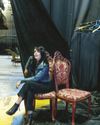
We’re living in the golden age of mental health. Since the pandemic, we’ve become more open and accepting of people’s trauma. Workplaces are creating safe spaces for their employees that put an emphasis on mental wellness – from offering mental health days for when you become overwhelmed to hybrid work methods that are flexible to your needs. Instagram and social media communities teach us how to communicate our boundaries with others, and TikTok therapists show us the importance of talking about our pain.
We should be thriving. But what if we’ve gone too far? Have we started overidentifying with our trauma?
What is woundology?
Woundology might sound like a TikTok hashtag, but it’s actually a term that’s been doing the rounds for a while. In 1988, wellness author Caroline Myss coined it to describe the tendency of people to identify strongly with their emotional wounds, and to use them as a primary source of identity and validation. Woundology suggests some people become so entwined with their traumas that their entire sense of self revolves around them.
In her book Why People Don’t Heal and How They Can, she describes how she came upon the concept: ‘One day, in passing, I introduced a friend of mine to two gentlemen I was talking with. Within two minutes, my friend managed to let these men know that she was an incest survivor. Her admission had nothing whatsoever to do with the conversation we’d been having, and in a flash I realised that she was using her wounds as leverage. She had got to the point where she defined herself by a negative experience.’
This story is from the {{IssueName}} edition of {{MagazineName}}.
Start your 7-day Magzter GOLD free trial to access thousands of curated premium stories, and 9,000+ magazines and newspapers.
Already a subscriber ? Sign In
This story is from the {{IssueName}} edition of {{MagazineName}}.
Start your 7-day Magzter GOLD free trial to access thousands of curated premium stories, and 9,000+ magazines and newspapers.
Already a subscriber? Sign In

'DESIRE IS NOT WHAT MATTERS'
Emily Nagoski wrote the book on women and desire - literally. And then her own sex life dried up. Here's what a prolonged sex drought (and a load of research) taught her about maintaining intimacy in a long-term relationship.

'We have to tell HARD STORIES'
Theatre director and playwright Yaël Farber is spending time in South Africa after her critically acclaimed run of King Lear at the Almeida Theatre in London. We chatted to her about the importance of the pursuit of truth.

THE WHY, THE WHICH & the wardrobe
We really got into it this month! Read on for more on the allure of a loosey-goosey jumpsuit, vintage-hunting and jingle-jangling jewellery, the best places to find quality African design and short-girl styling tips.

LIFT your GAME
Thought weightlifting was just for bodybuilders and powerlifters? Not so. In fact, 'lifting heavy shit' may be the secret to longevity, hormone regulation and mood for women through perimenopause and beyond.

TREATMENT PLAN ON YOUR MARKS
Armed with a six-month programme from Dr Nerina Wilkinson + Associates, Jennifer Morin set about tackling her sun damage and melasma.

PLAYING YOUR CARDS RIGHT
Here's how to get the most out of loyalty cards.

BIG SKY Country
Namibia. Twelve friends, five vehicles, 4000 km, thirteen days. Eight punctures, one angle grinder. One martial eagle, one full moon, one ghost town. Plenty of top-quality braais, maybe not quite enough oysters... and the best time ever.

IS YOUR HOME MAKING YOU SICK?
Leaks, damp and poor ventilation in old or poorly built new homes are being fingered for a growing health concern: mould.

HOW TO REALLY GET TO KNOW SOMEONE
The Korean word 'nunchi' describes 'the ability to be sensitive to other people's moods and thoughts'. It's an underrated skill that we seem to have lost.

How to write a memoir
Whether you want to share your experiences and insights with the world, leave a legacy or track pivotal experiences for yourself, writing your memoir can be a grand and worthwhile adventure. Here's some advice on how and where to begin.